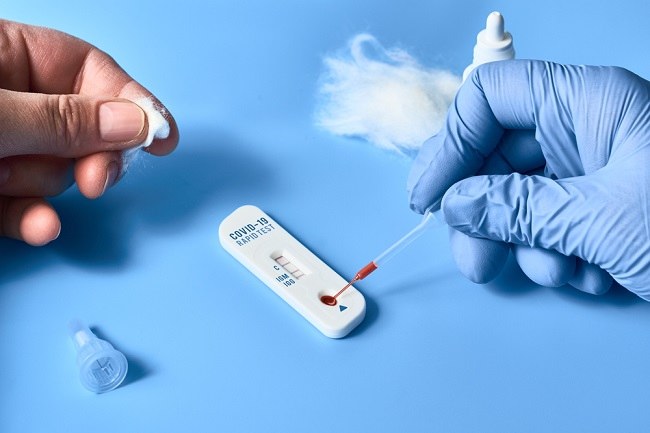Terbutaline is used to relieve the symptoms of wheezing, coughing, and shortness of breath due to asthma or chronic obstructive pulmonary disease, including emphysema or chronic bronchitis.
Terbutaline belongs to the bronchodilator group that works by widening the respiratory tract so that airflow is smoother. This drug will affect the receptors on the muscles of the respiratory tract so that they can be more relaxed. Terbutaline is available in oral and injectable forms. This medicine should only be used according to a doctor's prescription.

Terbutaline trademark: Astherin, Bricasma, Forasma, Lasmalin, Molasma, Nairet, Neosma, Terasma, Terbutaline Sulfate, Tismalin
What IThat's Terbutaline
| group | Prescription drugs |
| Category | Bronchodilators |
| Benefit | Overcoming the symptoms of wheezing, coughing, and shortness of breath, due to asthma or COPD |
| Used by | Adults and children |
| Terbutaline for pregnant and lactating women | Category C: Animal studies have shown adverse effects on the fetus, but there are no controlled studies in pregnant women. Drugs should only be used if the expected benefit outweighs the risk to the fetus. Terbutaline can be absorbed into breast milk. Do not use this medication without consulting your doctor if you are breastfeeding. |
| Drug form | Tablets, caplets, syrups, inhalers, respule, and inject |
Precautions Before Using Terbutaline
Terbutaline should only be used as prescribed by a doctor. Note the following points before using terbutaline:
- Always tell your doctor if you are allergic to terbutaline, other bronchodilator drugs, such as salbutamol, or to sympathomimetic drugs, such as epinephrine. This drug should not be used by patients with a history of allergy to these drugs.
- Tell your doctor if you have or are currently suffering from diabetes, low levels of potassium in the blood (hypokalemia), hypertension, seizures, hyperthyroidism, and heart disease, such as heart rhythm disorders or coronary heart disease.
- Tell your doctor if you are taking certain medications, supplements, or herbal products.
- Tell your doctor if you are pregnant, breastfeeding, or planning a pregnancy.
- Carry out regular check-ups and checks as recommended by your doctor while you are undergoing treatment with terbutaline.
- Do not drive a vehicle or do activities that require alertness after taking terbutaline, as this medicine may cause dizziness or drowsiness.
- Do not consume alcoholic beverages and reduce the consumption of caffeinated beverages while undergoing treatment with terbutaline.
- Call your doctor if your difficulty breathing gets worse or if your wheezing or shortness of breath doesn't improve after taking terbutaline.
- See your doctor right away if you have an allergic drug reaction, serious side effect, or overdose after using terbutaline.
Dosage and Rules for Use of Terbutaline
The dose of terbutaline will be adjusted according to the patient's condition and age. Below are common dosages for terbutaline use:
Purpose: Treating narrowing of the airways (bronchospasm) due to asthma or COPD
Drug form: Tablet
- Mature: 2.5 mg or 3 mg, 3 times daily. Dosage can be increased up to 5 mg if needed.
- Children >15 years old: 2.5 mg or 3 mg, 3 times daily.
- Children aged 12–15 years: 2.5 mg, 3 times a day.
- Children <12 years old: 0.05 mg/kg, 3 times a day. The dose can be increased slowly as needed. The maximum dose is 5 mg per day.
Drug form: inhaler
- Mature: 0.25–0.5 mg as needed. The maximum dose is 2 mg per day.
Purpose: Treat severe bronchospasm symptoms
Drug form: Nebulizer
- Mature: 2.5–10 mg, 2–4 times daily.
- child with weight25 kg: 5 mg, 2–4 times daily.
- child with weight<25kg: 2–5 mg, 2–4 times daily.
Drug form: Inject
- Mature: 0.25–0.5 mg, up to 4 times daily injected into a muscle (intramuscular/IM), a vein (intravenous/IV), or under the skin (subcutaneous/SC).
- Children aged 2–15 years: 0.01 mg/kgBW. The maximum dose is 0.3 mg/dose.
Injectable terbutaline can sometimes also be used to prevent premature birth. It will be given directly by the doctor. Condition monitoring will be carried out strictly. While terbutaline oral dosage form should not be used for this condition.
How to use Terbutalinecorrectly
Follow the doctor's advice and read the information listed on the drug packaging before using terbutaline. Do not increase or decrease the dose without consulting your doctor first.
Injectable terbutaline will be given by a doctor or medical officer on doctor's instructions. The injection will be done through an injection under the skin, muscle, or vein.
Terbutaline in the form of respule will be given via nebulizer. The terbutaline vapor then needs to be inhaled through a special mask or mouth tube (mouthpiece).
Terbutaline in inhaler form must be shaken before use. Open the inhaler cap, then put it mouthpiece inhaler between your teeth and close your mouth. Press the top of the inhaler to let the medicine out into the mouthpiece and inhale the drug.
Wait a few seconds, release the inhaler, and breathe again as usual. After that, clean the inhaler with a dry tissue.
Terbutaline in the form of tablets, caplets, and syrups can be taken before or after meals. Try to take the medicine at the same time every day so that the treatment is more effective.
If you forget to use terbutaline, do it immediately if the break with the next schedule of use is not too close. If it is close, ignore it and do not double the dose.
Store terbutaline in its package in a dry and cool place. Keep the medicine away from heat and direct sunlight. Keep medicine out of reach of children.
Interactions of Terbutaline with Other Drugs
The following are drug interactions that may occur if terbutaline is used with certain medicines:
- Decreased effectiveness of antidiabetic drugs, such as acarbose or metformin
- Decreased effectiveness of beta-blocking drugs, such as propranolol, nadolol, timolol, or pindolol
- Increased risk of developing potassium deficiency (hypokalemia) when used with diuretic drugs
- Increased risk of severe bleeding and heart rhythm disturbances when used with gaseous anesthetics, such as halothane
- Increased risk of fluid buildup in the lungs (pulmonary edema) if used with beta agonists or corticosteroids
Terbutaline Side Effects and Dangers
Side effects that may arise after using this drug are:
- Feeling restless
- Body shaking (tremor)
- Headache
- Dizzy
- Nausea or vomiting
- Drowsiness
Call your doctor if the above side effects get worse or if serious side effects occur, such as:
- Heart palpitations or irregular heartbeat
- High blood pressure
- Chest pain
- Muscle cramp
- Body feels weak
- Seizures
In addition, seek medical attention immediately if you experience an allergic reaction to drugs, also if asthma symptoms do not improve or get worse.









